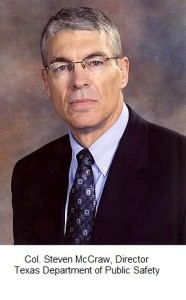 A federal lawsuit filed today in Austin describes a culture of “cronyism and outright corruption” in the Texas Department of Public Safety, alleging that top DPS officials whitewashed a a Texas Ranger’s role in a fatal car accident and quietly demoted another ranger who had been sleeping with a murder victim’s widow while he investigated the murder.
A federal lawsuit filed today in Austin describes a culture of “cronyism and outright corruption” in the Texas Department of Public Safety, alleging that top DPS officials whitewashed a a Texas Ranger’s role in a fatal car accident and quietly demoted another ranger who had been sleeping with a murder victim’s widow while he investigated the murder.
The lawsuit, filed on behalf of retired DPS investigator Darren Lubbe of Mt. Pleasant, claims DPS officials covered up criminal misconduct by senior commanders, Texas Rangers, and other favorites, yet fabricated documents in order to frame lower-ranking officers whom they disliked. (Full disclosure: I filed the lawsuit on Darren’s behalf).
The lawsuit also alleges that the chief of the Rangers Division was allowed to retire quietly in 2011 after he wrecked his car while driving drunk and then flashed his badge to the other driver and offered money for her silence. You can read the full lawsuit by clicking here.
For what it’s worth, I don’t particularly enjoy criticizing the Texas Rangers. I was once a deputy sheriff in East Texas, and my academy instructor awed us with stories about the history of the Rangers. I’ve also known some first-class Texas Rangers in my years as a reporter, cop, and lawyer.
That said, I’ve noticed that DPS officers from other divisions are often – how shall we say this? – unenthusiastic about the Rangers mystique. My own sense is that the Rangers Division has become too concerned about its image and not concerned enough about its integrity.
Below are a couple of paragraphs from the lawsuit. My friends in Longview will be interested in Paragraph 70.
69. A fatal traffic wreck involving Texas Ranger David Armstrong of Dallas is a good example of the double standards inside DPS. On February 2, 2017, Ranger Armstrong was returning from a special operations shift on the Mexican border when he crashed his DPS vehicle into a pickup truck, ejecting both the driver and the passenger. After several weeks, a DPS Highway Patrol accident reconstruction team was able to recover the vehicle’s computer to confirm his speed at the time of the crash. He was driving 84 miles per hour on Highway 281 in Premont, where the posted speed limit was 45 miles per hour. Ranger Armstrong fractured his hip, and his DPS vehicle burned down to the metal. The passenger of the other vehicle, 30-year-old JD Kristopher Trevino of Premont, died of his injuries five days after the wreck. Even though the accident occurred in Premont city limits, and even though accidents in municipalities are normally investigated by city police, DPS handled the investigation so it could cover up what happened. Among other things, Ranger Armstrong was violating a DPS safety rule at the time of the accident. That rule mandates that officers working on the border take a six-hour rest period before driving home, and the rule had been in effect for more than a year at the time of the accident. Ranger Armstrong had repeatedly violated the rule – a fact known to his supervisors – and he was violating it again when he was driving through Premont at 10:15 p.m. Although most drivers would have been charged with manslaughter, criminally negligent homicide, or at least reckless driving, Ranger Armstrong was never charged with anything, nor was he disciplined. Instead, the entire incident was covered up by senior DPS commanders, and Ranger Armstrong is now leading a high-profile investigation into a police shooting in Dallas.
70. In January of 2018, DPS supervisors discovered that Ranger Brent Davis was involved in an ongoing sexual relationship with Faezeh Pour Mogahdam Horaney of Longview. That might not be noteworthy but for the fact that Ranger Davis was also leading the investigation into the May 30, 2016 murder of Mrs. Horaney’s husband, Ronald “Ron” Horaney, a well-known businessman who was gunned down in front of his house. According to rumors within DPS, Ranger Davis helped Mrs. Horaney recover proceeds from her husband’s life insurance policy. Either way, Ranger Davis badly compromised the murder investigation, rendering his testimony worthless at trial and raising questions about whether he diverted investigative attention away from his mistress. Notwithstanding his gross misconduct and potential criminal activity, he was allowed to keep working for DPS as a law enforcement officer. Senior DPS commanders quietly demoted him from Ranger to trooper, but they told him that he would be eligible to re-apply for appointment as a Ranger within one year, i.e., as soon as January of 2019.
Incidentally, the Texas Legislature will convene in January, and legislators sometimes hold hearings and ask inconvenient questions. The Texas Alcoholic Beverage Commission took a beating in the last session, so now maybe DPS will have its turn in the barrel.
11/27/2018